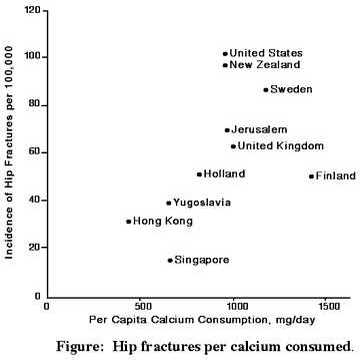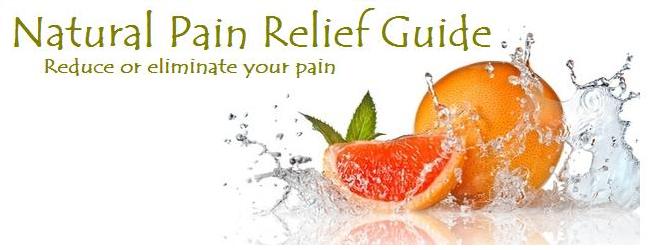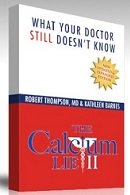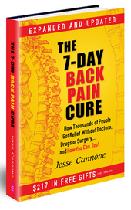|
Calcium is Not the Only Bone Building Mineral
You need calcium as a bone building material, right? Well, yes but you need more than that. There is more than just calcium in your bones and other substances are needed to do the work of building bones. We need to remember too that bones are living tissue not just something we make until we stop growing and then they just continue inert and unchanging.
Let's think about bone health and bone nutrition - something important at this time of year when roads and sidewalks can be slippery. I slipped on ice while walking recently and banged a hip and an elbow - thankfully no further damage.
 It is interesting that so much emphasis is put on calcium for bone health especially calcium from certain dietary sources. As I have written in an earlier article in this column, the rate of calcium intake is rarely a problem. Most people on western diets get several times the amount of people with much simpler, less-refined diets in less-developed countries where osteoporosis is very rare (See figure to right). The much greater problem in western, modern diets is the acid-forming nature of much of our food that causes leaching of calcium from our bones thus weakening them. The Harvard School of Public Health says that it is "not clear that dairy products are really the best source of calcium for most people." But here I would like to consider other issues like some nutrients beyond calcium that we should be concerned about.
The mineral magnesium in addition to calcium as a bone building material is also very important to build strong bones. It works as an enzymatic cofactor to incorporate calcium and other building blocks into bones. It is also needed for over 300 other biochemical reactions in the body, including protein synthesis, muscle and nerve function, blood glucose regulation and energy production. Do you get enough magnesium? Most people don't.
Because magnesium has so many functions, chronic low magnesium intake increases the risk of many illnesses. According to the National Institutes of Health, most of us are not getting optimal amounts of this important mineral in part due to a decrease in magnesium content in foods because of industrial farming practices, which deplete magnesium levels in the soil. Magnesium is needed to convert both vitamin D and calcium into their usable forms. For
conversion of the common vitamin D3 supplement into its active form magnesium is essential. Magnesium also activates a special hormone that pulls calcium from the blood and soft tissues, and incorporates it directly into bones thus helping to prevent a buildup in the soft tissues where calcium deposits can become a problem.
Magnesium is also needed for regular bone maintenance. The breakdown of old bone cells by special cells called osteoclasts and the building of new bone tissue (by osteoblasts) also depends on magnesium.
Aside from calcium and magnesium, vitamin K is also needed. People who are vitamin K deficient have a greater risk of fracture. In post-menopausal women who have started to experience unwanted bone loss, vitamin K has clearly been shown to help prevent fractures.
Low vitamin K intake is emerging as a dietary risk factor for osteoporosis. Researchers have shown that increasing dietary vitamin K intake by 100 mcg per day - roughly doubling the average American adult intake - for one full year can significantly increase bone density in post-menopausal women.
Vitamin K is essential and works with the other nutrients important to bone health - calcium, vitamin D, and magnesium - to ensure bone strength. Many of the best sources are green leafy vegetables as Vitamin K is required for photosynthesis. Fortunately, vitamin K is fairly stable in storage and only slightly affected by common cooking methods.
There have been no cases of anyone consuming a toxic dose of vitamin K from food. Considering its safety, the U.S. National Academy of Sciences has chosen not to establish a Tolerable Upper Intake Level for vitamin K. Further evidence for the safety of dietary vitamin K comes from research studies where doses of vitamin K at 500 times the Dietary Reference Intake level did not lead to observable toxicity.
People often take calcium pills daily (even just for heartburn) and lots of them now that osteoporosis has become so common. However, recent research points to calcium supplements posing a danger to heart health. Calcium plays many key roles in our health and is certainly needed but calcium as an isolated nutrient can be a problem. It needs to be consumed in the presence of magnesium and, for proper utilization, there must be vitamin K present as well.
When vitamin K levels are low, calcium collects in the blood and can lead to calcification in the arteries. The Rotterdam Study, which followed about 4,800 individuals for a 10-year period, showed that individuals who consume the most dietary vitamin K experience 50 percent less arterial calcification and cardiovascular death. Calcium belongs in our bones, not in our blood and Vitamin K helps to keep it in the right place.
And we should be getting our calcium (and, ideally, all nutrients) from whole foods where they come packaged not as isolated nutrients but along with the other nutrients needed to make them function as intended.
So, the take-away message should be to get enough calcium, yes, but try to get it in a natural form that includes the magnesium and vitamin K that are needed for its proper utilization. Avoid calcium supplements especially those with isolated calcium, get sufficient Vitamin D, consume a non-acid-forming diet and do some weight bearing exercise and your bones should last you a lifetime. For more information about calcium, magnesium and Vitamin K and their roles in bone health please visit
I have for a long time and will continue to eat lots of leafy greens such as spinach to get plenty of calcium and magnesium and vitamin K packaged all together in just the right way to maintain bone health so I don't have to worry about breaking a bone just from a slip on the ice.
For much more information on calcium as a bone builidng material, its role in bone health and the danger posed by some calcium supplements click the image to the right to get details on a FREE BOOK OFFER.
Sample of the sort of info in this book: "Calcium excess shrinks the brain and destroys the ability of memory cells to work. Women have nearly two times the risk of dementia as men. Guess why? The reason is primarily because they are dutifully taking their calcium supplements on doctors' recommendations that calcium will "prevent" osteoporosis. There are numerous reasons why this is erroneous..."
|
Keep up to date with
valuable insights into
pain management via
a healthy lifestyle.
Receive the monthly
Natural Pain Relief
Guide Newsletter.
News articles, health
tips, specials, freebies.
Enter your email and name
in the form to the right.
|
|
|









New! Comments
Have your say about what you just read! Leave me a comment in the box below.